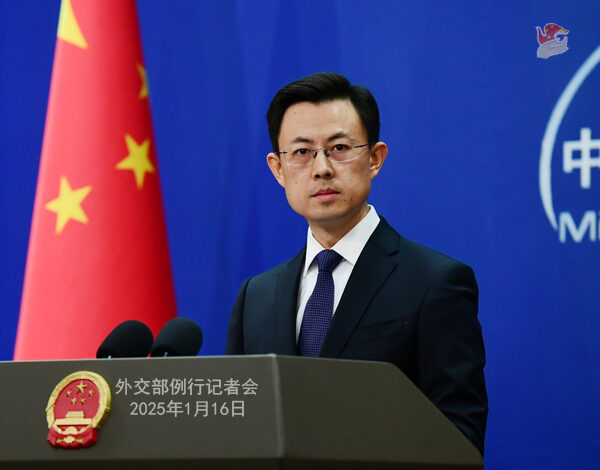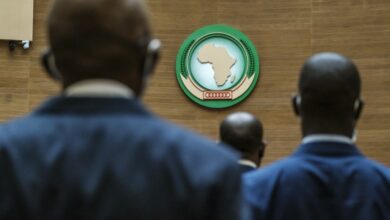Foreign Ministry Spokesperson Guo Jiakun’s Regular Press Conference on January 16, 2025

CCTV: On January 15, Israel and Hamas reached an agreement on ceasefire in Gaza and release of people being held. Do you have any comment?
Guo Jiakun: China welcomes the agreement and hopes that this agreement will be implemented effectively and that there will be a full and permanent ceasefire in Gaza.
Since the outbreak of the current round of conflict in Gaza, China has been calling for an early ceasefire and working actively for deescalation, protection of civilians and humanitarian assistance. China supports the implementation of the ceasefire deal and will continue to provide humanitarian assistance to Gaza and make strong effort for the resumption of post-war reconstruction. We also sincerely hope that relevant parties will take the ceasefire in Gaza as an opportunity to further deescalate the tensions in the region. China will work with the international community to make unremitting effort for peace and stability in the Middle East.
Xinhua News Agency: China has recently submitted to the secretariat of the United Nations Framework Convention on Climate Change (UNFCCC) the first biennial transparency report and the fourth biennial update report. The two reports give an overview of China’s achievements in climate response, including progress in realizing nationally determined contribution targets, rolling out climate mitigation policies, and cutting emissions. What’s your comment on China’s role in global climate governance in recent years?
Guo Jiakun: Climate change is a major global challenge. China attaches great importance to climate response and is one of the first countries to become a party to the UNFCCC and to sign and ratify the Paris Agreement. The two reports that China submitted recently reflect its transparency and professionalism on information sharing, and showcase various dimensions of China’s policies, measures, results and experience in climate governance.
The reports offer a glimpse of China’s resolve in and actions on actively responding to climate change and deeply engaging in global climate governance. China has never stopped promoting green development. The reports mentioned that in 2021, CO2 emissions per unit of GDP dropped by 50.9 percent compared with 2005 (the base year of nationally determined contributions). As public data shows, at the end of 2023, China’s installed renewable energy capacity surpassed the thermal power capacity for the first time in history. China has never let up in its effort to promote global low-carbon transition. In 2023 alone, the wind and photovoltaic products exported by China helped relevant countries cut 810 million tonnes of CO2.
Climate change requires a global response. China stands ready to work with all parties to uphold the principle of common but differentiated responsibilities, practice true multilateralism, and promote green development to protect the blue planet that we all call home.
AFP: US President Joe Biden yesterday ordered a two-year extension of the program allowing Hong Kong residents living in the US to stay beyond the expiry of their visas. Does China have a comment on this?
Guo Jiakun: Since the return of Hong Kong, the implementation of One Country, Two Systems in Hong Kong has been a well-recognized success. The security, democracy, and people’s freedoms and rights in Hong Kong are now under better protection, and Hong Kong enjoys more promising development prospects. No design to vilify Hong Kong will ever succeed or weaken international confidence in Hong Kong.
The US should respect China’s sovereignty and the rule of law in Hong Kong, abide by the principles of international law and basic norms governing international relations, stop denigrating the Hong Kong policy of the Central Government and the implementation of One Country, Two Systems, and stop meddling in Hong Kong affairs.
Yonhap News Agency: The incoming US Secretary of Defense Pete Hegseth at his confirmation hearing referred to the DPRK as a nuclear power. The governments of the ROK, US and Japan reiterated that they do not recognize the status of the DPRK as a nuclear-armed state, and their denuclearization policy on the DPRK remains unchanged. How does China view Hegseth’s remarks?
Guo Jiakun: China’s basic position on the Korean Peninsula issue remains unchanged. We believe that keeping the Peninsula peaceful and stable, and advancing the political settlement of the Peninsula issue serve the common interests of all parties, and hope that all parties will make an effort to this end.
AFP: Marco Rubio, Donald Trump’s nominee for Secretary of State, said yesterday at a confirmation hearing that China was the most potent and dangerous near-peer adversary that the US has ever faced. Rubio also said that the US must show China that it will pay too high a price if it invades Taiwan. Does China have a comment on this?
Guo Jiakun: China’s development is characterized by a distinct historical logic and strong endogenous driving force. There is nothing to hide about our goal, which is to deliver a better life for the people and make greater contribution to the world. We view and handle China-US relations in line with the principles of mutual respect, peaceful coexistence, and win-win cooperation put forward by President Xi Jinping, and resolutely safeguard our own sovereignty, security, and development interests. The US needs to establish a right perception towards China, and stop its illegitimate attacks and smears on China.
Taiwan is part of China and the Taiwan question is purely China’s internal affair, which brooks no foreign interference. The greatest challenge to cross-Strait peace is “Taiwan independence” separatist activities and foreign interference and disruption. The US needs to abide by the one-China principle and the three China-US joint communiqués, act on its commitment of not supporting “Taiwan independence,” stop abetting “Taiwan independence” separatist forces, and stop interfering in China’s internal affairs on the Taiwan question.
The Paper: It’s reported that Taiwan “foreign minister” Lin Chia-lung will attend the inauguration of Palau’s President as the “special envoy of Taiwan president” from January 15 to 18. What’s your comment?
Guo Jiakun: Taiwan is a province of China. There is no such thing as “president” or “foreign ministry” of Taiwan. There’s only one China in the world and Taiwan is an inalienable part of China. The one-China principle is a basic norm governing international relations and a prevailing consensus in the international community. The DPP authorities’ attempt of seeking “Taiwan independence” through foreign support and their secession attempt are doomed to fail.
We also noted that while the DPP authorities are trying to consolidate its so-called “diplomatic relations,” friendly personages in countries such as Tuvalu, Palau and the Marshall Islands expressed to us on multiple occasions their willingness of establishing or restoring normal diplomatic relations with China. China establishing or restoring diplomatic ties with these countries is where global opinion trends and the arc of history bends, and is only a matter of time. Let me reiterate that it’s never too late to make new friends and China stands ready to open up new chapters for relations with these countries on the basis of the one-China principle.
AFP: Three Chinese nationals have been sentenced to seven years in prison in the Democratic Republic of the Congo’s eastern region after being arrested in possession of gold bars and large sums of cash. Does the Foreign Ministry have a comment on this?
Guo Jiakun: The Chinese government always asks Chinese nationals overseas to abide by local laws and regulations. The Chinese Embassy in the Democratic Republic of the Congo (DRC) has had communication with the DRC, and is properly handling the situation. We also hope that the DRC will handle the case lawfully and justly, and ensure the legitimate rights and interests of the Chinese nationals concerned.
Bloomberg: China’s Sinopec is reported to have signed a deal for a oil refinery in Sri Lanka. Could the Foreign Ministry comment on and characterize this deal? What does it say regarding the economic ties between China and Sri Lanka?
Guo Jiakun: China and Sri Lanka are strategic cooperative partners with sincere mutual assistance and ever-lasting friendship. On the afternoon of January 15, President Xi Jinping held talks with Sri Lankan President Anura Kumara Dissanayake, who was on a state visit to China, at the Great Hall of the People in Beijing. President Xi noted that China and Sri Lanka enjoy a traditional friendship, and robust and steady growth of bilateral ties over the past 68 years since the establishment of diplomatic relations. The relationship has set a shining example of friendship and mutually beneficial cooperation between countries. With the concerted efforts of both sides, the strategic cooperative partnership featuring mutual assistance and ever-lasting friendship between China and Sri Lanka has grown from strength to strength. High-quality Belt and Road cooperation and exchanges and collaboration in various fields have delivered fruitful results, bringing tangible benefits to the two peoples. China and Sri Lanka today have a historic opportunity to build on what has been achieved and take the relationship into the next chapter. It is important to view bilateral relations from a strategic perspective and jointly build a China-Sri Lanka community with a shared future.
You may continue following the specific cooperation you mentioned.
AFP: The US announced further export controls yesterday on advanced computing semiconductors, increasing due diligence requirements for businesses. Does China have a comment on this?
Guo Jiakun: On the recent flurry of trade and tech regulations aimed at China from the Biden administration, the Ministry of Commerce has made clear China’s position. And China has lodged strong protests with the US. The US keeps overstretching the concept of national security, politicizing and weaponizing trade and tech issues, and using sanctions as a go-to tool. This seriously violates the legitimate rights and interests of companies from countries around the world, including China. This also jeopardizes market rules and the international trade order, destabilizes global industrial and supply chains, and undermines the common interests of US and other companies globally. What the US does is typical economic coercion and bullying. China deplores it and firmly opposes it.
I want to stress that no sanction or suppression will stop China’s development and progress, and no bullying or coercion will weaken China’s resolve in boosting its own strengths. We will take resolute measures to firmly safeguard the legitimate and lawful rights and interests of Chinese companies and individuals and our country’s sovereignty, security, and development interests.





